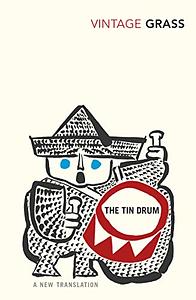Take a photo of a barcode or cover
Toen ik begon dacht ik, daar gaat ie dan, dikke pil Duitse literaire knaller, uiteraard in het Duits geluisterd. Na een goed begin dacht ik mooie zinnen, erg beschrijvend, maar om in de titel te blijven waar is de muziek tussen al die blikken herrie, alleen maar bomen, maar waar is het bos, zinnen, waar is de betekenis, waarom is dit een turning point is de Duitse literatuur? Dat laatste daar heb ik even onderzoek naar gedaan, blijkt de overgang van zakelijk naar vertellend te zijn, na ja, dat kun je zeker wel zeggen. En na nog vele uren kwam een vriend me te hulp met de opmerking de wereldgeschiedenis komt in de achtergrond voorbij, en verrek ja dat klopt, en in een klap let je meer op de achtergrond en verdwijnt het tromgeroffel ook enigszins ;-) Niet zelf opgemerkt omdat ik nu eenmaal niet zoveel met geschiedenis op heb.
Genoten van de taal, en meer dan normaal ook de geschiedenis, met name het aspect van een stukje Polen in Duitsland ;-)
Over dikke pillen en Duits gesproken, nu bezig met der Mann ohne Eigenschaften, 2141 pagina’s, ofwel in mijn termen 62 uur en 55 minuten luistergenot!!
Genoten van de taal, en meer dan normaal ook de geschiedenis, met name het aspect van een stukje Polen in Duitsland ;-)
Over dikke pillen en Duits gesproken, nu bezig met der Mann ohne Eigenschaften, 2141 pagina’s, ofwel in mijn termen 62 uur en 55 minuten luistergenot!!
challenging
dark
mysterious
reflective
slow-paced
Plot or Character Driven:
Character
Strong character development:
No
Loveable characters:
No
Diverse cast of characters:
No
Flaws of characters a main focus:
Yes
non voglio dire che in questo libro non ci siano stati un sacco di spunti interessanti su cui riflettere ma.. che fatica! troppi dettagli *-* finito giusto perchè dovevo
I doubt I will read this again, but I am curious to learn why it is so highly esteemed.
Imagine the experience of reading the original! I got crazy with the way Grass uses the language to tell Oscar’s story, even being a translation, so the cadence and rhythm in german are probably insane.
I rated the book four stars, instead of five, for the simple reason that the work was difficult for me to read. Though, I know The Tin Drum is a masterpiece and has been recognized as one. Another caveat, I saw the movie when I was almost finished with the book; the film helped me process the themes, metaphors, and characters. The actor, David Bennant, is superb in the movie, which won the Academy Award for Best Foreign Film in the late 1970's.
I believe themes common to literature are well represented--good vs evil, art vs. war, guilt vs. forgiveness, different forms of love/infatuation/sexual desire to name a few. The book consists of different episodes, often repeated, expanded, or varied, with Oskar as protagonist. These stories are humorous, poignant, quirky, or disgusting. Oskar is a self-imposed dwarf, who perplexes all around him--is he character, narrator, observer, or all three? Does he have feelings or is he just a literary device? Grass wrote beautifully, using alliteration and described senses vividly. The book obviously deals with the guilt and culpability of the Germans during World War II, which was probably cathartic for writer and reader when it was written and published. Common objects serve as symbols and are repeated throughout the book, including the red and white tin drum.
I lived, breathed, and immersed myself in this book, partly to stay motivated to finish and because it is weirdly fascinating. One spoiler--if you love to eat eel, you may not after reading the book!
I believe themes common to literature are well represented--good vs evil, art vs. war, guilt vs. forgiveness, different forms of love/infatuation/sexual desire to name a few. The book consists of different episodes, often repeated, expanded, or varied, with Oskar as protagonist. These stories are humorous, poignant, quirky, or disgusting. Oskar is a self-imposed dwarf, who perplexes all around him--is he character, narrator, observer, or all three? Does he have feelings or is he just a literary device? Grass wrote beautifully, using alliteration and described senses vividly. The book obviously deals with the guilt and culpability of the Germans during World War II, which was probably cathartic for writer and reader when it was written and published. Common objects serve as symbols and are repeated throughout the book, including the red and white tin drum.
I lived, breathed, and immersed myself in this book, partly to stay motivated to finish and because it is weirdly fascinating. One spoiler--if you love to eat eel, you may not after reading the book!
I haven’t read this yet but thrift books sent me the German version so I probably never will
Really interestingly written. It's a very original story that felt almost inspirational to me, in that I as a non-writer wanted to create my own novel while reading it, simply because I found the style so mesmerising. An incredibly unique piece of literature that I would recommend to anyone wanted something a little more intriguing. I feel like I never have enough to say about good books on the first read because I just find myself passively content with them rather than subconsciously building up a list of things to express negatively through a review. So I think that's all I have to say right now.




